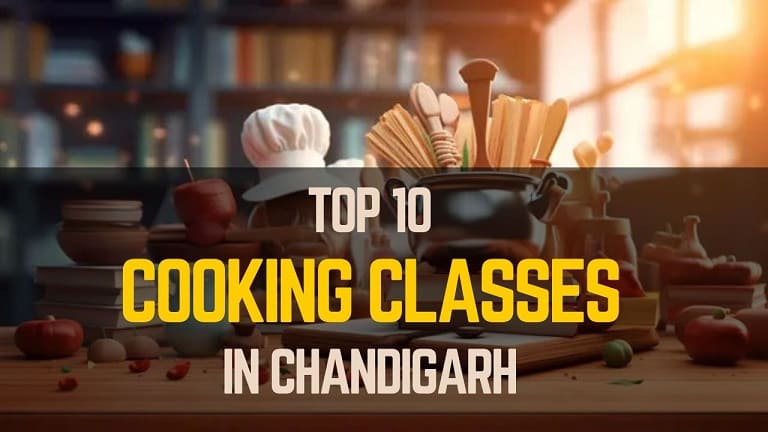Top 10 Cooking Classes in Chandigarh
Cooking Classes in Chandigarh – Cooking classes are educational programs designed to teach individuals how to prepare various dishes, improve their cooking techniques, and explore different cuisines.
These classes are suitable for beginners who want to learn the basics of cooking, as well as advanced enthusiasts who seek to refine their skills. Cooking classes can take place in person or online, offering flexibility and diverse options for learning.
Types of Cooking Classes
Beginner Cooking Classes: These classes are designed for individuals with little to no experience in the kitchen. They focus on fundamental skills like chopping, sautéing, baking, and basic cooking techniques. Recipes typically include simple, everyday meals.
Advanced Cooking Classes: For those with more experience, advanced classes focus on honing specific skills such as fine-dining techniques, creating gourmet dishes, mastering sauces, and working with complex ingredients.
Themed Cooking Classes: These classes focus on a particular cuisine or cooking style. Examples include:
Italian Cooking Classes: Learn to make pasta from scratch, classic Italian sauces, and desserts like tiramisu.
Baking Classes: Focus on cakes, pastries, bread, and other baked goods, with techniques like frosting and decorating.
Vegan and Vegetarian Cooking Classes: Specialize in plant-based recipes, teaching how to prepare delicious and nutritious meatless meals.
Indian Cooking Classes: Explore the rich variety of Indian spices, curries, rice dishes, and snacks.
Chinese or Thai Cooking Classes: Dive into stir-fries, dumplings, and exotic curries, focusing on authentic flavors.
Specialty Classes: These might include unique topics such as:
Cooking for Health: Classes that focus on making nutritious meals, learning about superfoods, or meal planning for specific dietary needs.
Farm-to-Table Cooking: Emphasizing local, seasonal ingredients and sustainable cooking practices.
Cooking with Kids: Fun and engaging classes designed for children to learn cooking basics and create easy meals.
Holiday and Event Cooking: Classes that teach you how to prepare meals for special occasions like Thanksgiving, Christmas, or birthdays.
Private or Group Cooking Classes: Depending on your preference, you can either take one-on-one sessions with a chef or join group classes. Group sessions often have a social aspect and allow students to share their experiences.
Benefits of Cooking Classes
Skill Development: Cooking classes help participants learn new techniques, improve knife skills, understand cooking terminology, and become proficient in preparing a variety of dishes.
Confidence Boost: For beginners, cooking classes can increase confidence in the kitchen by demystifying cooking and making the process fun and manageable.
Cultural Exploration: Cooking classes offer a deeper understanding of different cultures through their food. You can learn how to cook international cuisines and gain insight into traditional cooking methods.
Social Experience: Many cooking classes are designed to be interactive and fun, making them an excellent way to bond with friends, family, or even meet new people who share your passion for food.
Healthy Cooking: Learn how to prepare healthy meals using fresh ingredients and create balanced dishes that support a nutritious lifestyle.
Time and Money Saving: Cooking classes can teach you how to make restaurant-quality meals at home, saving you the cost of dining out and giving you more control over your ingredients.
What You’ll Learn in Cooking Classes
Knife Skills: How to safely and efficiently use a knife for different tasks (chopping, slicing, dicing, etc.).
Cooking Techniques: Mastering various techniques like roasting, grilling, sautéing, steaming, and poaching.
Flavor Pairing: Understanding how to balance flavors using spices, herbs, and seasonings to create well-rounded dishes.
Meal Planning and Prep: How to organize your kitchen, prepare meals in advance, and maximize efficiency.
Presentation Skills: Learn how to beautifully plate your dishes for that professional touch.
Special Diets: Cooking for specific diets, including low-carb, gluten-free, or dairy-free meals.
Where to Take Cooking Classes
Cooking Schools: Many cities have dedicated cooking schools that offer classes for all skill levels. These schools may have experienced chefs as instructors and provide fully-equipped kitchens for hands-on learning.
Online Cooking Classes: With the rise of digital platforms, many cooking classes are now available online. Websites like MasterClass, Udemy, and Skillshare offer video tutorials taught by renowned chefs. These can be convenient for those with busy schedules.
Community Centers: Some community centers or local organizations offer affordable cooking classes, often focused on specific cuisines or dietary needs.
Private Chef Classes: If you prefer a more personalized experience, you can hire a private chef to give you individual cooking lessons in your own kitchen.
Cooking Classes at Restaurants or Specialty Stores: Some restaurants or food stores host cooking classes as part of their offerings. This can be a great way to learn from professionals in a live, real-time setting.
How to Choose the Right Cooking Class
Your Skill Level: Select a class that matches your experience. If you’re a beginner, start with basic techniques, while more experienced cooks can explore advanced classes.
Culinary Interests: Consider the type of cuisine or cooking method you want to learn more about. If you love baking, opt for baking classes; if you’re interested in Asian cuisines, try Chinese or Japanese cooking classes.
Instructor Experience: Check the background of the instructor. A good instructor will not only be skilled but also know how to communicate effectively and make the class engaging.
Class Format: Decide if you prefer in-person learning or online courses. In-person classes often offer hands-on experience, while online classes offer more flexibility.
Budget: Cooking classes vary in price, so choose one that fits your budget. Private classes tend to be more expensive, while group classes are more affordable.
Cooking classes are an excellent way to enhance your culinary skills, learn new techniques, and explore different cuisines.
Whether you’re a beginner looking to develop basic cooking skills or an experienced cook aiming to master a specific style, cooking classes offer a structured environment where you can learn and grow.
They also provide a fun and social way to bond with friends, family, or even colleagues while creating delicious dishes together.
FAQ
Is cooking class important?
Cooking classes are vital for developing essential life skills. They teach students the basics of food preparation, nutrition, and kitchen safety. These classes empower individuals to independently create healthy, delicious meals, reducing reliance on processed foods and takeout.
Cooking skills foster creativity, boost confidence, and promote more nutritious eating habits. Moreover, they can lead to potential career opportunities in the culinary industry or enhance one’s ability to entertain and connect with others through food.
What to expect in a cooking class?
A typical cooking class balances theory and hands-on practice. Expect to learn about ingredients, cooking techniques, and food safety. You’ll actively participate in food preparation, including chopping, mixing, and cooking.
Classes often cover menu planning, plating, and tasting. Instructors demonstrate skills and guide you as you practice. Some courses may include nutrition education or focus on specialized cuisine. The goal is to build practical skills and confidence in the kitchen.
What is a cooking class called?
In high schools, cooking classes are often called “Culinary Arts.” This comprehensive course covers food preparation, nutrition, culinary techniques, and safety. You might find “Culinary Skills” or “Professional Cooking” courses in vocational settings.
Recreational classes may use terms like “Cooking Basics” or “Gourmet Cooking.” The name can vary based on the focus and level of the course, from beginner to advanced professional training.
Which course is best for cooking?
The best cooking course depends on your goals and experience level. Popular options include:
- Certificate in Food Production (6-12 months)
- Diploma in Culinary Arts (1-2 years)
- BA in Culinary Arts (3-4 years)
- BHM Culinary Arts (3-4 years)
- PGD in Culinary Arts (1-2 years)
Choose based on desired depth, time commitment, and career aspirations. Short courses are great for hobbyists, while degree programs suit those pursuing professional culinary careers.
What is the purpose of cooking classes?
Cooking classes serve multiple purposes:
- Teach essential culinary skills and techniques
- Introduce new ingredients and cuisines
- Improve food safety knowledge
- Enhance menu planning and budgeting skills
- Provide hands-on experience in food preparation
- Offer opportunities to taste and evaluate dishes
- Build confidence in the kitchen
- Foster creativity and experimentation with food
- Promote healthier eating habits
- Create a fun, social learning environment
What is the benefit of learning cooking?
Learning to cook offers numerous benefits:
- Control over ingredients and nutrition
- Cost savings compared to eating out
- Improved health through better food choices
- Enhanced creativity and self-expression
- Stress relief and mindfulness
- Social bonding through shared meals
- Cultural exploration via diverse cuisines
- Development of time management skills
- Increased self-sufficiency
- Potential career opportunities in the food industry
Cooking skills contribute to a healthier lifestyle and greater independence in daily life.
How many types of cuisine are there?
There are numerous cooking methods, with 15 standard techniques:
- Baking
- Roasting
- Grilling
- Broiling
- Sautéing
- Frying
- Stir-frying
- Boiling
- Simmering
- Steaming
- Poaching
- Sous vide
- Stewing
- Blanching
- Microwaving
Each method imparts unique flavours and textures to food. Mastering various techniques expands culinary possibilities and enhances overall cooking skills.
Is cooking an excellent skill to have?
Cooking is an invaluable skill that offers numerous benefits:
- Promotes healthier eating habits
- Saves money on food expenses
- Enhances creativity and problem-solving
- Improves math and science skills through practical application
- Boosts confidence and self-reliance
- Provides a therapeutic outlet for stress relief
- Facilitates social connections through shared meals
- Offers potential career opportunities
- Allows for cultural exploration through diverse cuisines
- Develops time management and multitasking abilities
These advantages make cooking a versatile and rewarding skill to possess.
Who is eligible for the cooking course?
Eligibility for cooking courses varies depending on the level and institution. Generally:
- Introductory courses: Open to all, no prerequisites
- High school programs: Enrolled students
- Certificate programs: High school diploma or equivalent
- Diploma/Associate degrees: High school diploma, sometimes with minimum GPA
- Bachelor’s degrees (e.g., B.HMCT): 10+2 or equivalent, often with 50% aggregate marks
- Advanced courses: May require prior culinary experience or education
Some programs may have age restrictions or require English proficiency. Always check specific requirements with the institution offering the course.
Is cooking a good course?
Culinary courses are excellent for various reasons:
- Develop practical, lifelong skills
- Open doors to diverse career opportunities
- Foster creativity and self-expression
- Improve health awareness and nutrition knowledge
- Enhance cultural understanding through global cuisines
- Provide a foundation for entrepreneurship in the food industry
- Offer hands-on, engaging learning experiences
- Develop teamwork and communication skills
- This can lead to high-demand, well-paying jobs
- Applicable in personal life for better health and socializing
Cooking courses offer valuable knowledge and skills for personal growth or professional aspirations.
Thanks for visiting – Chandigarh News



